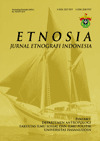Abstract
Along with the advancement of Information and Communications Technology, the internet plays a massive role in South Korean idol groups' rapid growth. Global fans quickly become one of the crucial elements that heavily influence idol groups’ global popularity. BTS Army is one of the largest music fandoms in the past several years. This research analyzes fan culture using the case of BTS Army community in Surabaya. This research employs a qualitative method under a virtual ethnographic approach. This research conducts participant observation, in-depth interviews, focus group discussions, literature studies, and documentation on collecting the data. This research finds that online media provides a space for the mem Army community in members Surabaya to actively interact with each other as they share ideas and discussions over various BTS activities. The online interaction also leads to offline activities (e.g., regular fan-meetings, BTS members’ birthday celebrations, and other social activities). The research concludes that global fandom also acts as social agents. The observation of the BTS Army community in Surabaya shows that BTS’s charity works (e.g., Love Yourself campaign) influence the fans to be more involved in various social movements such as hosting multiple charity events.References
Achmad., Z. A. (2019). Integrasi Program Dakwah dan Budaya: Studi Etnografi Virtual Mediamorfosis Radio Nada FM Sumenep Madura. Jurnal Komunikasi Islam, 9(2), 238–263. https://doi.org/10.15642/jki.2019.9.2.238-263
Achmad, Z. A., & Ida, R. (2018). Etnografi Virtual Sebagai Teknik Pengumpulan Data Dan Metode Penelitian. The Journal of Society & Media, 2(2), 130. https://doi.org/10.26740/jsm.v2n2.p130-145
Achmad, Z. A., & Ida, R. (2019). The Shifting Role of The Listeners in the Mediamorphosis Process of Culture Radio: A Case Study of Jodhipati 106,1 FM. Masyarakat, Kebudayaan Dan Politik, 32(3), 240–250.
Aditia, A. (2019). BTS Sebut Army Indonesia Terbesar di Asia. Entertainment.Kompas.Com. https://entertainment.kompas.com/read/2019/10/16/170614010/bts-sebut-army-indonesia-terbesar-di-asia
Ardia, V. (2014). Drama korea dan Budaya Popular. Jurnal Komunikasi, 2(3), 12–18.
Big Hit Entertaiment. (2020). Discography: BTS. Ibighit.Com. https://ibighit.com/bts/eng/discography/
Blake, E. (2018). The Strength Of K-Pop Fandom, By The Number. Forbes.Com. https://www.forbes.com/sites/emilyblake1/2018/04/04/k-pop-numbers/#2bb1cc9c48ab
Boellstorff, T., Nardi, B., Pearce, C., & Taylor, T. . (2003). Ethnography and Virtual Worlds: A Handbook of Method (Issue 1). Princeton University Press. https://doi.org/10.16309/j.cnki.issn.1007-1776.2003.03.004
Bok-rae, K. (2015). Past , Present and Future of Hallyu (Korean Wave). American International Journal of Contemporary Research, 5(5), 154–160. http://www.aijcrnet.com/journals/Vol_5_No_5_October_2015/19.pdf
Booth, P. (2018). A Companion to Media Fandom and Fan Studies. A Companion to Media Fandom and Fan Studies, 1–563. https://doi.org/10.1002/9781119237211
Chang, Y. (2014). Research on the Identity Construction of Korean Pop Music ’ s Fandom Groups on the Weibo Platform , Exemplified by G-Dragon ( Kwon Ji-Yong ) [Uppsala Universitet]. In Thesis of Department of Informatics and Media Master Program in Digital Media & Society Uppsala University. https://doi.org/10.5194/acp-9-4039-2009
Duffett, M. (2013). Undestanding Fandom: An Introduction To The Study of Media Fan Culture (Issue 1). Bloomsbury. https://doi.org/10.16309/j.cnki.issn.1007-1776.2003.03.004
Hills, M. (2002). Fan Cultures (Studies in Culture and Communication). In Fan Cultures. Routledge.
Hine, C. (2000). Virtual ethnography. In Virtual Ethnography. Sage Publications. https://doi.org/10.4324/9781315797915-4
Ida, R. (2008). Consuming Taiwanese Boys Culture: Watching Meteor Garden with Urban Kampung Women in Indonesia. In A. Heryanto (Ed.), Popular Culture in Indonesia: Fluid Identities in Post-Authoritarian Politics (pp. 93–110). Routledge. http://www.magisterseniusu.com/uploads/1/8/0/0/1800340/_media_culture_and_social_change_in_asia_series__ariel_heryanto-popular_culture_in_indonesia__fluid_identities_in_post-authoritarian_politics_-routledge__2008_.pdf
Jang, W., & Song, J. E. (2017). The Influences of K-pop Fandom on Increasing Cultural Contact. Community Sociology, 18(2). https://barnettcenter.osu.edu/sites/default/files/2019-08/the_influences_of_k-pop_fandom.pdf
Jenkins, H. (1992). Textual Poachers: Television Fans & Participatory Culture. Routledge.
Jenkins, H. (2006). Fans, Bloggers, and Gamers: Exploring Participatory Culture. New York University Press.
Jin, D. Y. (2018). An Analysis of the Korean Wave as Transnational Popular Culture: North American Youth Engage Through Social Media as TV Becomes Obsolete. International Journal of Communication, 12, 404–422.
Kumbara, A. A. N. A., Dewi, A. . S. K., Liando, M. R., & Wiasti, M. (2020). Cultural Disruption and Challenges for Anthropology in the Development of Multicultural Communities. ETNOSIA : Jurnal Etnografi Indonesia, 5(1), 10. https://doi.org/10.31947/etnosia.v5i1.8679
Lamerichs, N. (2018). Productive Fandom: Intermediality and Affective Reception in Fan Cultures. Amsterdam University Press. https://doi.org/10.2307/j.ctv65svxz.15
Samovar, L. A., Porter, R. E., & McDaniel, E. R. (2010). Komunikasi Lintas Budaya: Communication Between Cultures. Salemba Humanika.
Sugihartati, R. (2017). Budaya Populer dan Subkultur Anak Muda: Antara Resistensi dan Hegemoni Kapitalisme di Era Digital. Airlangga University Press.
Tokopedia. (2019). Fakta Unik BTS ARMY, Fandom Terbesar di Dunia K-Pop. Tokopedia.Com. https://www.tokopedia.com/blog/profil-bts-army/
Wylie, H. (2019). BTS and UNICEF Call On Young People to Spread Kindness on International Day of Friendship: Global Pop Group Releases Video to Call for An End to Violence in and Around Schools. Unicef.Org. https://www.unicef.org/press-releases/bts-and-unicef-call-young-people-spread-kindness-international-day-friendship

This work is licensed under a Creative Commons Attribution-NonCommercial 4.0 International License.
Copyright (c) 2020 ETNOSIA : Jurnal Etnografi Indonesia





